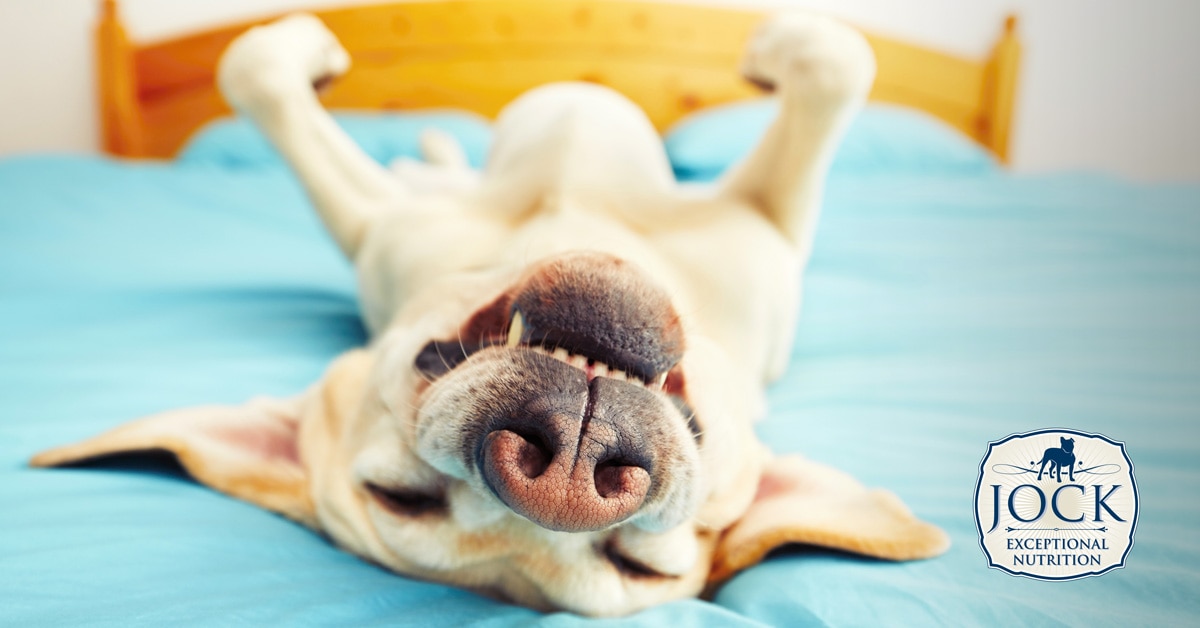Whether or not to let your dog sleep in your bed is a much more common concern than most people think. The old ‘a dog stays outside’ approach seems to be making way for a more intimate bond between dogs and their owners. But are there any health risks involved with allowing your dogs in bed? Is it good for your dog? And are there any psychological benefits to you? JOCK’s expert team did some research in order to get a look under the covers.
A US study found that 61% of small dogs, 41% of medium dogs and 47% of big dogs sleep in or on the beds of their human besties. A surprising number, considering the traditional wisdom that dogs are dirty and should sleep outside or in their own beds. Several studies have been done on the topic and the results might be somewhat unexpected.
Keeping it clean
Apart from people suffering from dog allergies or asthma, there seems to be very little evidence that a dog in your bed poses any health risk. It might seem like common sense, but let’s state it anyway: a dog in your bed is only as dirty as you allow your dog to be. If you allow your dog to rummage through the dustbin, then well, he’s going to bring whatever he picks up into your bed.
Some bed-sharing dog owners won’t allow their dogs into their beds unless they’ve been given a bath, wet wipe of strategic parts, brushing or tooth brushing. Others simply don’t mind a bit of dust or mud on the covers. It really does come down to personal preference. Having your dog dewormed, take its flea medication regularly and keeping its teeth healthy will take care of basic health issues. Needless to say, the length of a dog’s coat and amount of drooling will play its part in how clean your bed will be.
Puppies and potty-training
There’s nothing more comforting than having the sweet breath of a puppy in bed. Yet it’s important to know that young puppies may not be potty-trained yet, resulting in messy accidents in bed. A good guide is to let a puppy sleep in its own bed or crate until it’s old enough to be able to control his bodily functions and let you know when he wants to go outside.
Sleep disturbance
Interestingly, studies found that dog owners who let their dogs sleep in bed tend to fall asleep with more ease, but might have their sleep disturbed more. Dogs sleep in cycles of 3 or 4 hours, so tend to wake up and move around more, while people naturally sleep in longer cycles.
Issues of dominance
Some dogs will see their sleeping in your bed as a sign that they’re in control. If you experience any aggression or domination issues with a dog, especially around children, it’s best to make the boundaries very clear and not let the dog into your bed. Also be aware that having your dog in bed might lead to more separation anxiety, depending on you and your dog’s lifestyle.
Psychological benefits
A lot has been written about the positive influence that dogs can have on the mental well-being of their owners. Sleeping next to your dog can decrease stress levels and make one feel safe — especially because dogs are much more alert to any threatening sounds than us. Not to mention the presence of a living, breathing warm-water bottle! In people going through a difficult break-up or battling with depression, having a dog close to you at night can also contribute to a feeling of belonging and peacefulness.
Sweet dreams!

